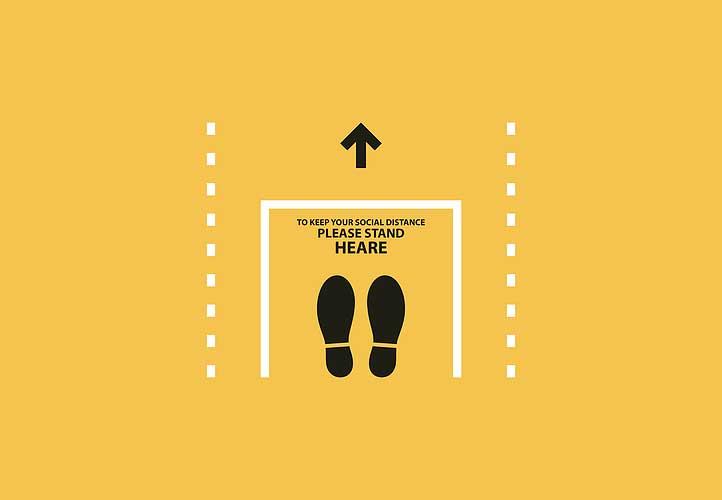Advice
Navigating the new normal
By: Barbara Mahon
Updated: 16 July 2020

Navigating the new normal
Over the last few weeks, we’ve seen the country open up again bit by bit. We can now go to the hairdresser, have a meal at a restaurant and see more of our friends and family. These freedoms bring a sense of relief. It feels like our world is beginning to open up and take on some semblance of how things were before the word Coronavirus entered our vocabulary. But then we go about our daily business and we realise that things aren’t quite what they used to be. There’s still a queue to get into shops. Public announcements remind us of the need to maintain social distance and to continue to wash our hands regularly. As a society, we’ve gotten somewhat accustomed to the new realities that the pandemic has brought about, but as we try to move forward, other “norms” change and adjust and seem quite fluid. Take, for example, wearing a face-mask on public transport. At first, this was encouraged; now it is mandatory. Then, on the one hand, the government is encouraging us to to holiday in Ireland this year, but on the other, airlines are advertising cheap flights; tantalising us with images of sun-soaked beach holidays abroad. These conflicting, confusing messages at times arise in quick succession in the media. And just when we think things seem safer, we start to hear about the possibility of a second wave of the virus. Again we are made wonder about the choices we are making and how they might affect ourselves and the people close to us. Change and uncertainty may make us feel on edge and anxious. How can we find our feet and feel some sense of grounding in this ever-evolving new world?
First and foremost, bear in mind what is within your control and what is not. What is within your control, for example, is following the latest information and advice, eating well, exercising and cultivating connections. What is outside your control includes other people’s decisions, other people’s health, the government’s actions and the schools opening or closing. As we try to return to our more regular routines, from going back to the workplace, to engaging in various activities where we are in closer proximity to people not from our own household, there may be a tendancy to to judge others on their level of compliance with hand sanitisation or social distancing, for example. But remember, that is not within your control and focussing on it will only increase stress and anxiety levels.
Secondly, incorporate some mindfulness into your day. Mindfulness comes in lots of different forms, from mindful walking or eating, to breathing exercises, drawing and meditation. You can even be mindful when washing the dishes and doing other household chores. The practice need not be long; even 5 minutes a day will help re-set the nervous system, calm the mind and help build resiliance. For example, if you’re walking, eating or hoovering, notice everything about it using your senses: take in first all the details of what you see; the colours, shapes and textures, then notice what you smell, any tastes or sensations in your mouth, then notice any sounds around you. Finally, notice what you can feel, from where the air touches your skin to what your hands or feet might be contact with. Anxiety has its roots in our thoughts about the future, but by practicing mindfulness, we allow ourselves to come fully into the present moment, breaking the cycle of repetive, sometimes compulsive thinking, that leads to feelings of stress and anxiety.
Finally, be kind to yourself and to others. What we are experiencing right now is new to everyone and each of us need to find our own level with it. If you think you would benefit from more support and a dedicated space to talk about your feelings, counselling sessions are available from the therapists at MyMind. Feel free to browse the profiles on the website to find the right therapist for you, or to reach out to the team at the MyMind HQ for more information.
By Barbara Mahon - Psychotherapist
MENTAL HEALTH PROFESSIONALS WORKING WITH Anxiety ISSUES:
Approach: Humanistic & Integrative Psychotherapy , Person-Centred Therapy
Works with: Individual Session
Specialities: Anxiety , Bereavement / Loss , Depression , Neurodiversity , Personal Development , Relationship issues , Self Care , Self-Esteem , Stress
Next avaialble appointment: 9:00 29 April 2024
Approach: Gestalt Therapy , Cognitive Behavioural Therapy (CBT) , Humanistic & Integrative Psychotherapy , Person-Centred Therapy , Psychodynamic Therapy , Solution-Focused Brief Therapy
Works with: Individual Session
Specialities: Addiction , Anxiety , Bereavement / Loss , Depression , Relationship issues , Self Care , Self harm , Somatic Experiencing , Stress , Suicidal Ideation / Self Harm , Trauma , Work Issues, Work/Life balance
Next avaialble appointment: 11:00 29 April 2024
Approach: Psychodynamic Therapy , Humanistic & Integrative Psychotherapy
Works with: Individual Session
Specialities: Anger , Anxiety , Domestic Violence / Abuse , Personal Development , Relationship issues , Self Care , Self-Esteem , Stress , Trauma , Work Issues, Work/Life balance
Next avaialble appointment: 15:00 27 April 2024
Search
Get The Support You Need
From One Of Our Counselors
News
Isolation
Anxiety
Depression
Relationship Issues
Counselling
Personality Disorder
Addiction
Trauma
Children and Adolescent
Anger
Bereavement
Chronic Illness
Communication Issues
Eating Disorder
Post natal depression
Stress
LGBTQI+
Panic Attack
OCD
Resilience
Parental support
Category List
All Posts
News
Isolation
Anxiety
Depression
Relationship Issues
Counselling
Personality Disorder
Addiction
Trauma
Children and Adolescent
Anger
Bereavement
Chronic Illness
Communication Issues
Eating Disorder
Post natal depression
Stress
LGBTQI+
Panic Attack
OCD
Resilience
Parental support

